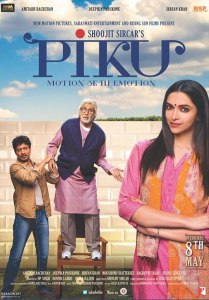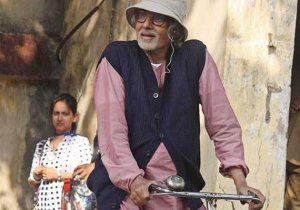Shoojit Sircar’s Piku could be summarised as two hours of Bhaskor (Amitabh Bachchan) and his shit, literal and figurative. He is a man obsessed with his ever-present constipation, and that and his intelllectual superiority are his favourite topics of conversation. Luckily there is more than just a constipated old man to this story and for me, Piku (Deepika Padukone) is the real heart of the film.
Bhaskor is well intentioned but domineering and contradictory. I found him slightly monstrous as his self-absorption is limitless, and for all his manners he is often unkind. He won’t let his daughter marry saying that is a ‘Low IQ’ thing to do and he wants more for her than to be a man’s wife, but he also insists she do as he says. On the one hand he talks about how much he loved his wife, then criticises her for being so unhappy (because he made her unhappy by marrying her). He introduces her to prospective suitors by telling them she isn’t a virgin, and asking if they have a problem with that. They mightn’t care, but for me his lack of empathy for Piku is very off putting. The family is loud and shouty, all of them totally obsessed with their bowels or Bhaskor’s motions, but there is no lack of love. Arguments get heated then suddenly devolve into giggles or reminiscences, a nicely realistic note.
Amitabh effortlessly dominates the scenes he is in, even when he is sleeping. He does a little OVER!ACT!ING!, particularly towards the beginning of the film when Bhaskor is being set up as irascible and a bit quixotic. But when he hits his stride, he is delightful and charismatic. My favourite scene was when Bhaskor comes home from a party a little drunk. He puts on old records and starts dancing. At first he is playing to his judgemental daughter, twisting and mugging to get a laugh and stop her from telling him off. But then his moves change and he seems to have journeyed back to an earlier happier time, not even looking at Piku, as he gently dances to a much loved song. Her expressions are perfect as she moves from anger to concern to grudging amusement before sashaying back to her room, half dancing along. For me, that perfectly expressed the love and tension when the child becomes the caretaker and has to deal with their parents’ mortality.
At first I thought this was going down the path of a modern woman has to be an aggressive, unpleasant, and possibly slutty woman. But Piku is overruled by her father and his innards, her clients often ignore her design advice, and she has no one who will really listen so I can’t blame her for getting irritable. Piku is aware of how much her father’s needs and demands are shaping her days, but she is doing what she thinks is right so doesn’t feel bitter. Her love life is limited to the occasional hookup with her business partner Syed (Jisshu Sengupta) and she doesn’t invest time in notions of romance. At first glance Piku is abrasive, but Deepika is lovely, warm, and…real as she adds and removes layers to her character. The rapport between Piku and Rana develops slowly, borne by the conversations and observations of people stuck in a car with a cranky old man. He sees past her tough front, and she sees his apparent laziness is more of a weary pragmatism which she can relate to.
Irrfan (apparently he needs no surname these days) can be hit (Life in a Metro) or miss (do we all remember Krazzy 4?). This performance is a hit for me, and Rana suits his slightly offbeat delivery and everyman style. He and the Big B do indulge in one scene that is more like an improv no one knows how to end, but generally he concentrates on being Rana rather than on skills demonstrations. I felt Rana was a kind of proxy for the viewer as at first he is overwhelmed by Piku’s bolshy character, all the cacophony, and the incessant examination of digestive functions, but gradually he sees behind the bluster. He tries to offer advice and be helpful at home and at work, but his platitudes are rejected. It’s only when he gets real that he is heard. The nascent relationship between Piku and Rana is based on mutual understanding and respect and there is no insta-love personality transplant or makeover required.
Moushimi Chatterjee is a whirlwind as Piku’s Aunty, and brings some fun and a much needed opposing voice to Bhaskor’s benevolent dictatorship. Budhan (Balendra Singh) is a hapless servant, attending to all Bhaskor’s bathroom related chores. While I did laugh at some of his scenes, I could have lived without all the poo jokes.
Whistling in a soundtrack is generally an indicator of whimsy, which is not my most loved style. But apart from a propensity for emo guitar tweedling, Anupam Roy’s soundtrack suits the drama and the pared back style very well, and I enjoyed it and the songs used in the background.
Piku has a flavour of the middle cinema of the 70s; not realism but realistic. The characters felt like they had roots. While the cinematography was beautiful, it wasn’t distracting, more often giving the viewer a fly on the wall glimpse of what was going on. There were a few indulgently arty shots in Kolkata, but who could complain about that? Some of the dialogue feels improvised and Juhi Chaturvedi’s screenplay gives a distinct voice for each character, whether through their blend of languages or the formality of their speech.
Not much really happens in Piku, but all the characters go on a bit of a journey beyond the physical road trip. I laughed, the lady sitting next to me cried and we all did a bit of ‘you go girl’ affirmative nodding. See this for Deepika Padukone giving a fine performance as a modern, complex woman and for some late career Big B magic.
(Note: Maybe don’t see this if even mild toilet humour grosses you out.)










Nice Review!
Piku tugs at our heartstrings, making us laugh and cry at the same time and manages to deliver a serious message about life in an altogether non-serious manner. It makes for a great family viewing and can be enjoyed by anyone and everyone. And, yes, Piku’s innocent toilet humor may be at the receiving end of some flak from certain sections of audiences but most viewers will certainly appreciate the spirit in which it’s done.
Here’s the link to my review of Piku:
http://www.apotpourriofvestiges.com/2015/05/piku-2015-shoojit-sircars-evocative.html
LikeLike
Just watched this yesterday, and loved everything about it. Every last bit of it. 🙂
LikeLike
I was so happy to see a simple story, well told, and beautifully acted.
LikeLike
I haven’t seen this yet, but from reading your review it almost seems like there’s a flavor of Emma to this – is that accurate? If so, do you think it’s intentional?
LikeLike
Hi 🙂 I don’t think so….From what little I recall, Emma largely meddled in other people’s lives and was blind to her own (signficiant and very irritating!) flaws, and prone to fits of overactive imagination. Piku is far more pragmatic, she feels the responsibility of trying to support and care for her dad, and while she is bossy it is largely for her own benefit and not to sort out anyone else’s life. But they are both a little difficult to like at first glance.
LikeLike
Two of the best highlights for me in the movie:
1) Rana being a civil engineer who went to gulf and came back. (civil engineer-architect pairing!! civil engineers joke that architects are better at talking to get credit for what civil engineers end up building 😉 )
2) Piku is disappointed when the badminton game ends at Kolkata house without her having a chance to play. Later, we are shown Piku and Rana playing badminton at Piku’s house in Delhi.
LikeLike
Hello! It’s been ages! I liked the badminton theme too, and particularly liked that in that end scene, Piku could argue AND play at the same time 🙂 I did see 36 Vayadhinile, and quitre liked it especially for Jyothika. I still want to see How Old Are You as people kept telling me it was sooooooo much better (as regional Indian film fans tend to do 😉 ) Cheers, Temple
LikeLike
I check out Cinema chaat regularly but don’t have much time these days for watching any movies. 😦
Look forward to your reviews on both of them now. 🙂
LikeLike